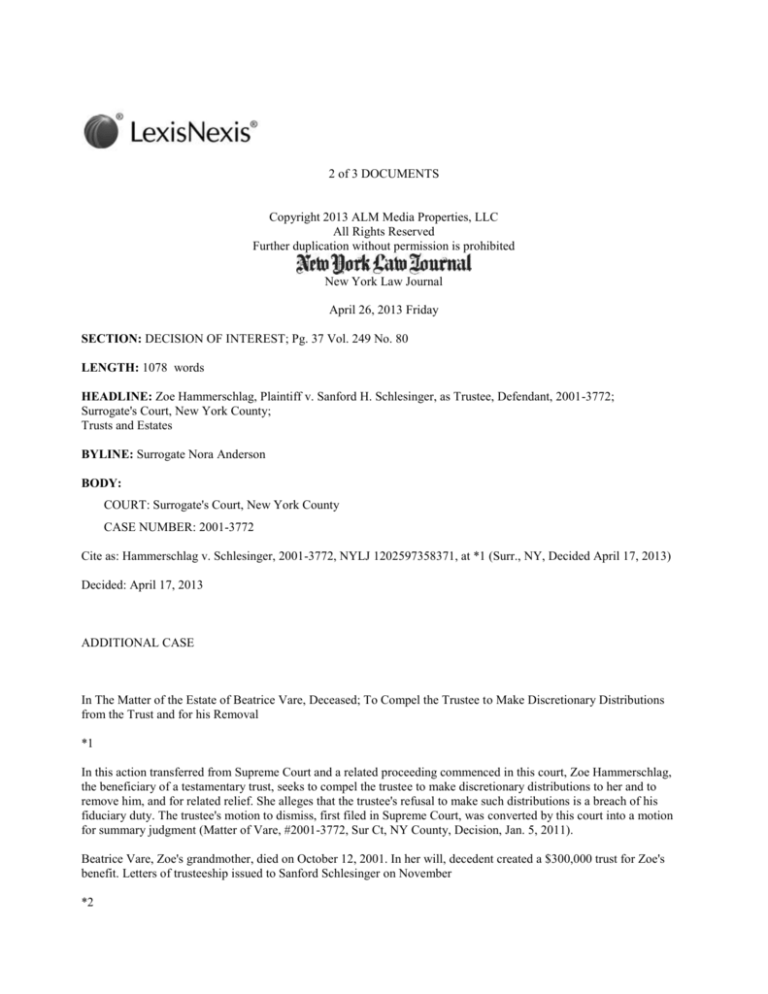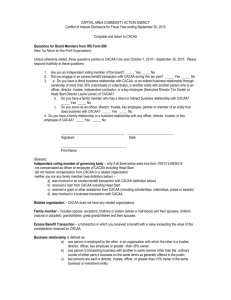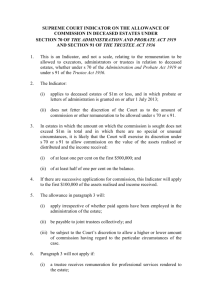
2 of 3 DOCUMENTS
Copyright 2013 ALM Media Properties, LLC
All Rights Reserved
Further duplication without permission is prohibited
New York Law Journal
April 26, 2013 Friday
SECTION: DECISION OF INTEREST; Pg. 37 Vol. 249 No. 80
LENGTH: 1078 words
HEADLINE: Zoe Hammerschlag, Plaintiff v. Sanford H. Schlesinger, as Trustee, Defendant, 2001-3772;
Surrogate's Court, New York County;
Trusts and Estates
BYLINE: Surrogate Nora Anderson
BODY:
COURT: Surrogate's Court, New York County
CASE NUMBER: 2001-3772
Cite as: Hammerschlag v. Schlesinger, 2001-3772, NYLJ 1202597358371, at *1 (Surr., NY, Decided April 17, 2013)
Decided: April 17, 2013
ADDITIONAL CASE
In The Matter of the Estate of Beatrice Vare, Deceased; To Compel the Trustee to Make Discretionary Distributions
from the Trust and for his Removal
*1
In this action transferred from Supreme Court and a related proceeding commenced in this court, Zoe Hammerschlag,
the beneficiary of a testamentary trust, seeks to compel the trustee to make discretionary distributions to her and to
remove him, and for related relief. She alleges that the trustee's refusal to make such distributions is a breach of his
fiduciary duty. The trustee's motion to dismiss, first filed in Supreme Court, was converted by this court into a motion
for summary judgment (Matter of Vare, #2001-3772, Sur Ct, NY County, Decision, Jan. 5, 2011).
Beatrice Vare, Zoe's grandmother, died on October 12, 2001. In her will, decedent created a $300,000 trust for Zoe's
benefit. Letters of trusteeship issued to Sanford Schlesinger on November
*2
9, 2001. The trustee is directed to pay over income and/or principal to or for Zoe's use as he, in his "sole and absolute
discretion, after due regard to any and all other property, funds and resources (both income and principal) which may be
available to or for the use and benefit of Zoe may deem necessary or proper for her education, health, maintenance or
support." When Zoe reaches age 30, she will receive one-half of the remaining principal. At 35, the trust will terminate
and Zoe will receive the remainder.
Zoe, who is now 26 years old, alleges that she has no assets, no means of support, is homeless and lives on the
generosity of unrelated third parties. She seeks funds to secure an apartment for herself and her son and seeks regular
monthly payments for rent (at $2,000/mo.) and other expenses (at $1,500/mo.) for a period of two years, as well as a
lump sum payment of $15,000, and additional money to eliminate a tax lien, pay her lawyer in a criminal matter and
pay back third parties who have supported her. She further alleges that the trustee has made no independent
investigation to determine her needs and has acted in bad faith by relying on information he has received from her
mother, from whom she is estranged, in determining that he will not make discretionary distributions to her.
The trustee, for his part, explains his decision not to make distributions by recounting a fairly dramatic tale of Zoe's
*3
unsavory behavior, including various acts of fraud and theft against her mother and her father, some of which led to the
criminal charges against her. He maintains that some of the expenditures that Zoe requests would constitute an
inappropriate use of the trust assets, that others are not documented or supported (for example, she provides no specifics
about an apartment she would rent, no budget for other expenses, and no information about the amount of funds
provided to her and her child by the child's father or his family). The trustee asserts that he has exercised his judgment
in good faith based upon his desire to preserve the assets until she is more fiscally responsible, and relies upon the
absolute discretion given him by the testator to support his decision to refuse distributions to Zoe at this time.
On a motion for summary judgment, the burden of proof is on the movant, who:
"...must make a prima facie showing of entitlement to judgment as a matter of law, tendering sufficient evidence to
demonstrate the absence of any material issues of fact.... Failure to make such prima facie showing requires a denial of
the motion, regardless of the sufficiency of the opposing papers.... Once this showing has been made, however, the
burden shifts to the party opposing the motion for summary judgment to produce...proof in admissible form sufficient to
establish the existence of material issues of fact which require a trial of the action...." Alvarez v. Prospect Hosp., 68
NY2d 320, 324 (1986) (citations omitted).
On a motion for summary judgment, the court's function is to
*4
find factual issues, not to determine them (Sillman v. Twentieth Century-Fox Film Corp., 3 NY2d 395, 404 [1957]). In
determining whether issues of fact exist, the court must view the evidence in a light most favorable to the opposing
party, and must give that party the benefit of every inference which can be drawn from it (Dauman Displays, Inc. v.
Masturzo, 168 AD2d 204 [1st Dept 1990]; Schuhmann v. McBride, 23 AD3d 542, 543 [2d Dept 2005]).
Applying this stringent standard here, the court cannot say that the trustee has met his burden of proving entitlement to
judgment as a matter of law. The beneficiary claims that the trustee failed to exercise his discretion or act in good faith
by failing to heed or investigate her claims that she was danger of losing her home and ultimately rendered homeless, as
well as by taking at face value negative information about her from her mother, from whom she was estranged.
The court recognizes that the discretion given to the trustee by the testator is extremely broad. However, even such
broad discretion is not unbounded. The court is empowered to review the exercise or non-exercise of a discretionary
power conferred upon the trustee to prevent any abuse in the exercise of that power (Restatement [Third] of Trusts, sec.
50; Matter of Wallens, 9 N.Y.3d 117 [2007]; Matter of Celeste Trust, NYLJ, Dec. 14, 2005 at 27, col 3 [Sur Ct, NY
County]). The trustee must actually exercise judgment in order to exercise his
*5
discretion in good faith (id.), and viewing the record in the light most favorable to the beneficiary, as the court must do,
it can be seen as containing an open question of fact as to whether the trustee failed to exercise his independent
judgment or adequately evaluate the beneficiary's needs before refusing to make any distribution to her from the trust,
and thus whether he made a good faith determination as to whether distributions to her would carry out the intent of the
testator to benefit her. The beneficiary is thus entitled to an opportunity to prove at a hearing her claims that the trustee
abused his discretion.
Accordingly, the trustee's motion for summary judgment is denied, and a hearing will be held on the allegations of the
petition on July 8, 2013, at 11:00 AM.
This decision constitutes the order of the court.
Dated: April 17, 2013
LOAD-DATE: April 26, 2013







